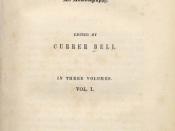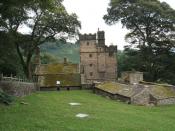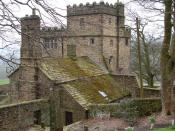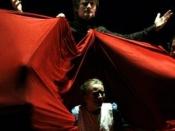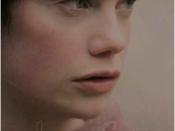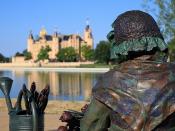Bertha Mason's Extraordinary Contrast Author Richard Feinman describes life as "encompassed by the effects of others"ÃÂ (http://www.greenleafenterprises.com). Feinman's definiton of the effects of environment on life shows the significance of the roles of aquaintances in one's life. The effects of one's environment is one of many variables in the sculpture of one's personality. Bronte's Jane Eyre incorporates the role of minor characters producing major effects for the main character in the story, Jane. Bertha Mason's minor role of the complete contrast to Jane's personality entirely redirects Jane's life in the opposite direction of her status of happiness in life. In Bronte's Jane Eyre, the minor character of Bertha Mason completely redefines Jane's life-- creating a development in Jane's personality that leads her to true happiness.
The introduction of the mysterious character of Bertha is a revelating incident of fate in Jane's life. This character, mistakenly thought by Jane to be someone else (Grace Poole), is actually Bertha Antoinetta Mason Rochester--Rochester's wife.
Bertha's horrifying self is evident when Jane first sees her, thinking the experience was a nightmare: "Fearful and ghastly to me "ÃÂ oh, sir, I never saw a face "ÃÂ it was a savage face" (281). The astonishing discovery of Bertha is heart-breaking to Jane, but at the same time increasingly positive to Jane's future. Rochester says, "Bertha Mason is mad; and she comes of a mad family; - idiots and maniacs through three generations! Her mother, the Creole, was both a mad woman and a drunkard! "ÃÂ as I found out after I had wed the daughter: for they were silent on family secrets before" (289).
Bertha represents the complete contrast to Jane in the novel: she is the insane, crazy, mysterious character in the attic. Bertha encompasses the raw sexuality suppressed by Jane and Rochester, which BrontÃÂë enhances as a vice in the novel. Bertha's madness and sensuality bring Jane and Mr. Rochester together, which BrontÃÂë portrays through the similarities and differences between Jane and Bertha. The speaker says, "One never knows what she has, sir: she is so cunning: it is not in mortal discretion to fathom her craft"æthe lunatic [Bertha] sprang and grappled his throat viciously, and laid her teeth to his cheek: they struggled" (290). Bertha's sexual attack on Rochester completely differs from the relationship he shares with Jane. Through the oddity of Bertha's sexual assaults, Rochester's propensity of love gradually moves towards Jane.
Through Rochester's sensual desire for Bertha that he becomes trapped in his marriage, a marriage where he locks himself in the attic because Bertha's emotions are raw and uncontrollable. In essence, Bertha becomes insane as she destroys Jane's wedding veil, realizing her husband only married her for sexual pleasure and money: "She took my veil from its place; she held it up, gazed at it long, and then she threw it over her own head, and turned to the mirror"æit removed my veil from its gaunt head, rent it in two parts, and flinging both on the floor, trampled on them" (281).
Bertha's destruction of Jane's wedding veil portrays Bertha's impurity; a wedding veil is a true symbol of purity and innocence. Foreshadowing the destruction of Jane's relationship with Rochester, the wedding veil enhances the bitter contrast between Bertha and Jane. The effect of the truth of Bertha's marriage to Rochester is evident as Jane expresses her true as she leaves him, "May your eyes never shed such stormy, scalding, heart-wrung tears as poured from mine. May you never appeal to Heaven in prayers so hopeless and so agonized as in that hour left my lips: for never may you, like me, dread to be the instrument of evil to what you wholly love" (317) Bertha's increasing madness leads her to set fire to Thornfield Hall: "Thornfield Hall is quite a ruin: it was burnt down just last harvest time"æThe fire broke out at dead of night"æthe building was one mass of flame" (415). The destruction of Thornfield leads to the destruction of Bertha. In the fire Bertha dies: "She was a big woman, and had long, black hair: we could see it streaming against the flames as she stood. I witnessed, and several more witnessed Mr. Rochester ascend through the skylight on the roof: we heard him call "Bertha!" We saw him approach her; and then, ma'am, she yelled, and gave a spring, and the next minute she lay smashed on the pavement."à(417) As Bertha is destroyed, the contrast of her and Jane's personality is no longer prevalent.
Bertha's absencce from the novel is the key to the reunion of Jane and Edward's undying love for each other as they marry following Bertha's death.
Bronte's purpose for Bertha was to play the enigma to Jane, delivering Rochester's love through their contrasting personalities. The significant effects of Bertha in the novel delineate the importance of minor characters' role in the development of Jane.
